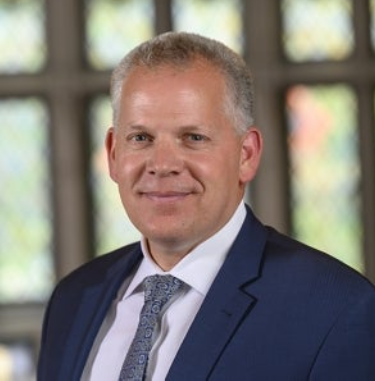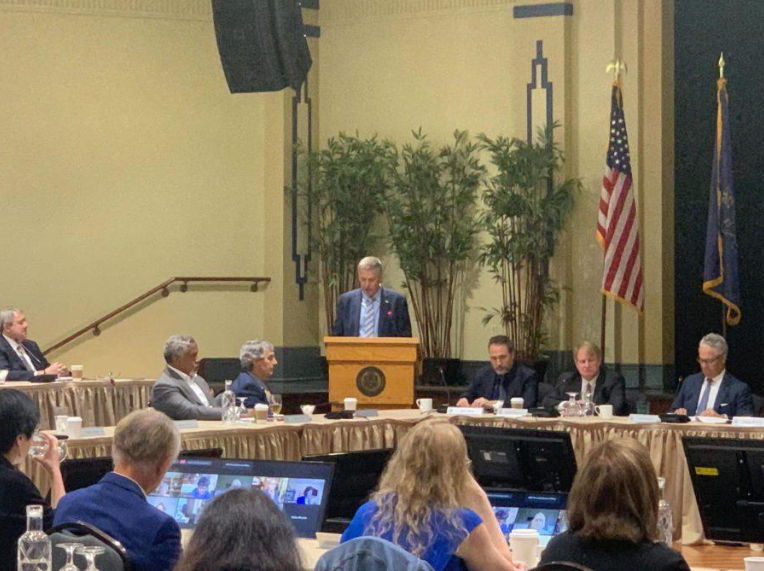A series of disruptive actions interrupted the University of Pittsburgh’s Board of Trustees meeting on September 29. In the aftermath, administrators’ feelings on the disruptions ranged from “disappointed” to “disgusted.”
Before the meeting, over 100 members of the Pitt Faculty Union gathered in the William Pitt Union lobby, outside the Assembly Room where the meeting was scheduled to take place, to demand that administrators return to negotiations and agree to their demands for a contract. The members of the Faculty Union occupied the lobby and sang the union hymn, “Solidarity Forever,” before leaving of their own accord 10 minutes before the meeting was scheduled to begin.
During the meeting, four groups of three each rose in succession to interrupt the meeting with a speech, and were each swiftly escorted out by police. Demands from the first three groups, collectively identifying themselves as Trans Action Building, included: the creation of resource centers for LGBTQ+, disabled, and BIPOC students, which are common at other universities; increases in pay for all Pitt staff, including student workers; and widely accessible transgender-inclusive healthcare and housing for students. The fourth group, Fossil Free Pitt, demanded the university cease its ongoing $450 million investment in fossil fuels.
Dean of Students Carla Panzella was not happy with the actions of the students and faculty. “I am disgusted,” Panzella said. “It was sickening. I physically felt ill. They had no right to do this, and I want to speak to their manager.”

Following the end of the meeting, Chancellor Joan Gabel declined to comment on the protests’ demands. “While I believe there are better ways for people to draw attention to their causes, I absolutely support their right to protest,” Gable said after the meeting. While exiting the building, Gabel was heard muttering under her breath, calling the protestors “ungrateful little bastards” and declaring, “they will pay, they will all pay with their blood.”

Interim Provost Joseph McCarthy said he was “disappointed” by the manner of the actions. “It’s not that hard to submit a request to speak,” McCarthy said. Pitt says members of the public can ask to address the Board by submitting a written request at least 15 days before the meeting. The request must be submitted by etching it into a stone tablet and hand-delivering it to the Board’s temple at Mt. Roclympus, on the 600th floor of the Cathedral of Learning.

Whether or not the request is even granted is up to the chairman of the Board. “In the end, the chair decides whether the request is worthy of beholding by the almighty Board,” said McCarthy. “However, a little blood sacrifice often helps sway his mind.”
Following the resignation of the previous chair in August, Louis Cestello was elected the new chairman at the meeting on September 29. Chairman Cestello could not be reached for comment on the speaking request process. A spokesperson for his office gave the following statement: “Mr. Cestello is a very busy man, and does not have time to concern himself with the matters of peons.”

The delay caused by student actions took up all of five minutes of the Trustees’ time. The largest delay to this meeting was not caused by any student or faculty disruptions, but in fact by the Trustees themselves. The meeting began nearly 40 minutes after its scheduled start time. According to Interim Provost McCarthy, this was because the Trustees were late finishing their brunch.
“We had this huge breakfast buffet catered for us, and there were just so many options that there was no way they would start that meeting on time,” McCarthy said. “We were reveling in it all. We were all going back for fourth helpings. When you’re a Pitt administrator, you can do stuff like this for yourself, we’re rolling in dough.” When asked about the demands of the protestors, McCarthy declared that the demands could not be met because “we don’t have that kind of money.”
